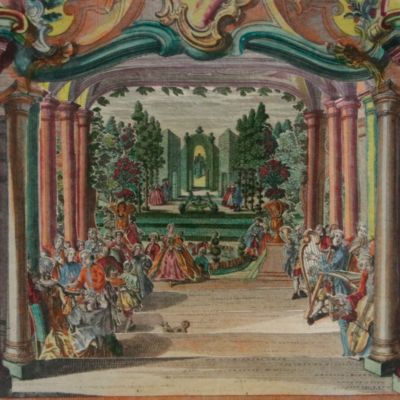[Paper Peepshow]
Large garden concert.
[Augsburg, M. Engelbrecht, [ca. 1750]. Seven large, oblong cardboard sheets (ca. 16.0 x 20.0 cm), with fine hand-colouring, being six cards with delicate cut-outs and one backpanel, together forming a garden concert scene. Preserved in contemporary wrappers with handwritten text Concert de Musique.
A wonderfully preserved set of the rarer large-size 18th-century peepshows (with seven cards), which are more usually found in a "medium" (ca. 14 x 9 cm) or "small" (ca 9 x 7 cm) format, each usually with only six cards. A complete set of all seven cards, with delicate cut-outs and fine hand-colouring. The cards are numbered 38 [246]-252 in print on the versos. "Martin Engelbrecht (1684-1756), a native of Augsburg was the son of a colour merchant. He began his career as an artist by the attachment to a local publishing house but had by 1708 moved to Berlin where he was engaged in the designs after Eosander von Goethe of a the Silberbüfett im Ritterall at Berlin and of a porcelain cabinet in Charlottenberg. Returning to Augsburg he was involved in illustrating a wide variety of works after various artist mainly on subjects connected with the decorative arts. However in 1711 Engelbrecht was again in Berlin working at a fine art publishers with his older brother Christian Engelbrecht (1672-1735). They decided to start their own independent publishing house at Augsburg in 1719 where they produce a wide variety of graphic works. It was with peepshows Martin Engelbrecht excelled having the unique position of no other publishing house or place of publication to compete against him. Engelbrecht was kept busy with the many other special graphics and employed two artists, Jeremias Wachsmuth (1711-1771) and Johann David Nessenthaler (1717-1766), to produce designs for the peepshows. Wachsmuth’s work can be found as early as 1731, and those by Nessenthaler starting from 1737. With Martin Engelbrecht's death in 1756 the business continued to thrive under the management of Engelbrecht's daughters and sons-in-law, and continued on well into the nineteenth century." (Marlborough Rare Books Catalogue, List XLV, 2009. pp. 33-34). A very good set, showing a seldom-seen subject. Rare.




